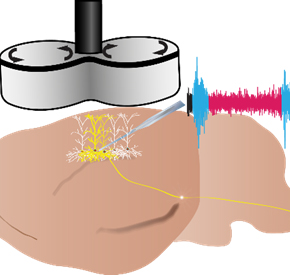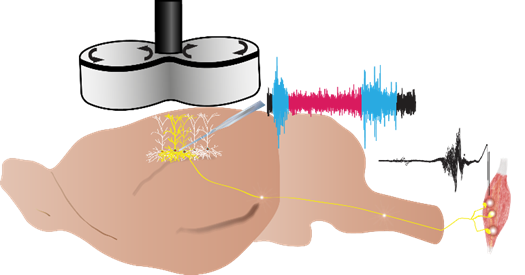Brain stimulation and cortical plasticity

Research Area:
Neurophysiology and Brain StimulationResearchers:
Vishnudev Ramachandra; Martin A. Giese; Alia Benali;Collaborators:
Cornelius Schwarz (HIH Institute); Ulf Ziemann (HIH Institute); Klaus Funke (RUB Bochum); Bingshuo Li (NIN NL); Axel Oeltermann (MPI Tübingen); Friederike Pfeiffer (CIN Tübingen); Tsutsui Ken-Ichiro (University of Sendai Japan)Description:
In the past, methods such as brain stimulation were used to understand the brain and its functions. Later it was found that brain stimulation can also lead to changes in the brain functions and trigger plasticity, a potential of the brain to react to new environmental conditions. Therefore, brain stimulation is currently used to treat cortical dysfunction, which is the basis for neurological and neuropsychiatric disorders ranging from Parkinson's disease to obsessive-compulsive disorder, anxiety, depression and addiction.
Our group aims to study and understand the mechanisms and circuits triggered by brain stimulation. In particular, we study the mechanisms of non-invasive interventions of transcranial magnetic stimulation (TMS) and invasive interventions of intracortical micro-stimulation, which are used to promote the reorganization and repair of neuronal circuits.
Our team uses electrical recordings to study the activated circuits. A major problem we face is in detecting a small electrical signal below a strong magnetic/electrical field; a task that cannot use standard electrophysiological devices. Therefore, we developed new recording systems that allow us to record neuronal activity with minimal data loss around the stimulation period. In our group we pursue several approaches:
- Further development of electrophysiological recording systems (Ramachandra, Li and Benali, Schwarz in cooperation with Axel Oeltermann)
- Probing the neuropysiological effect of TMS (Benali, Ramachandra, Li, Giese, Ziemann & Schwarz)
- Novel analysis techniques using machine-learning approaches for removal of TMS induced artifact (Ramachandra, Benali and Giese)

This project has received funding from the DFG GZ: BE 6084/2-1.

